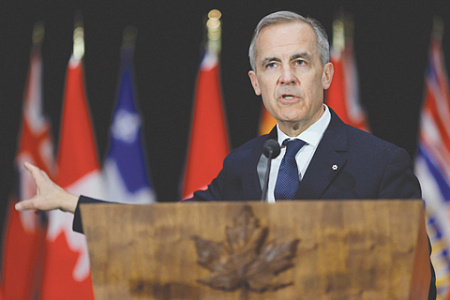
Canadian Prime Minister and head of the Liberal Party Mark Carney is ready to announce the date of parliamentary elections, British media reported. The vote is scheduled to take place on April 28, which means that the liberals and their conservative opponents will have little time left for the election campaign. Carney hopes that his party will successfully use the moment to raise its rating against the background of conflicting rhetoric with the President of the United States, Donald Trump. And the opponents of the liberals are deprived not only of a moral advantage, but also of an important argument in the form of criticism of Justin Trudeau, who resigned under pressure from party members.
The parliamentary elections in Canada were not scheduled to take place until October this year, but experts predicted an earlier date for the vote. Nevertheless, the appointment of an election date before May came as a surprise to a number of analysts.
Carney has a formal reason to hold the vote earlier. He is one of the very few prime ministers of the country who were heads of the cabinet without having a seat in parliament.
The Prime Minister wants to fix this point. He will run from the Ottawa metropolitan suburb of Nepean. Carney argues for his decision by saying that it was in Ottawa that he raised his children and it was there that he decided to devote himself to serving civil society.
Carney’s chances of personal success in the election are more than significant.
Donald Trump has unwittingly done liberals a huge favor. The trade war between Ottawa and Washington literally saved the ratings of the liberals, who made many mistakes under Justin Trudeau. One of them is the holding of early parliamentary elections in 2021. Then, against the background of a successful response to the challenges of the coronavirus, Trudeau decided to take advantage of a convenient moment. Many Canadians were outraged by this.
And the New Democratic Party refused to continue participating in the coalition. The head of the party, Jagmeet Singh, announced that the Liberal Party no longer protects the interests of Canadians. In fact, Trudeau has turned from the most politically correct and attractive politician into a opportunist who is trying his best to stay in the prime minister’s chair.
This provoked a wave of calls from party members for Trudeau to resign. The final nail in the prime minister’s political career was the resignation of Finance Minister Chrystie Freeland. Trudeau wanted her to be willing to spend money on social policy, despite the growing budget deficit. Besides, Freeland herself was not averse to replacing Trudeau.
But in the end, Carney won, even though he was not a member of parliament. The former head of the Bank of Canada and the Bank of England managed to convince voters of his competence in the election of the head of the party. And the lack of a seat in the House of Commons gave him an extra reason to hold elections faster, without the threat of reproaches from Canadians for neglecting democracy.
Carney argues that for the government to act decisively, it needs a full-fledged mandate from the voters. And the possibility of freedom of action is important in the context of a trade war with the United States. This war is more than full-fledged, not half-hearted.
After Trump’s audacious statements, national consciousness has awakened in Canadians. It has suddenly become fashionable to hang the country’s flag over your home or in your car. Canadians now prefer national products and food, and try to buy fewer American goods.
On his first foreign visit as prime minister, Carney went not to the United States, but to France and the United Kingdom. Moreover, he sought support precisely in the context of the trade war, especially from the Fifth Republic and its head Emmanuel Macron.
The Conservatives turned out to be guiltlessly to blame. They are also happy to resist Trump’s policies and pursue an independent course that does not overlap with the American conservatives MAGA (Make America Great Again). However, the average Canadian is likely to choose liberals anyway, and the point here is the struggle of symbols. Conservatives advocate policies similar to Trump and the Republicans.
And liberals embody with their ideology that Canadians are original and that they are not Americans. It is this idea that has now captured the minds of even cosmopolitan Canadians.
In December, the Conservatives’ ratings were about 45%. Now they have dropped as much as 36%. The rating of liberals, according to various polls, is 38-40%.
